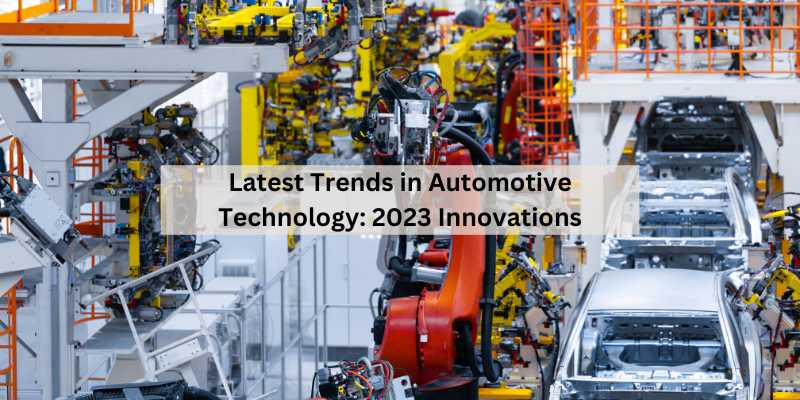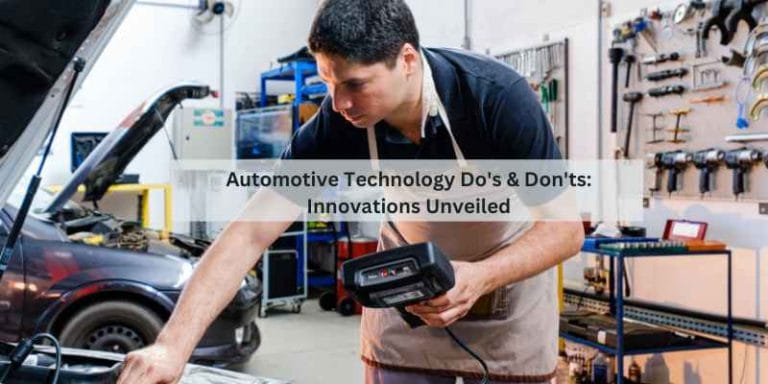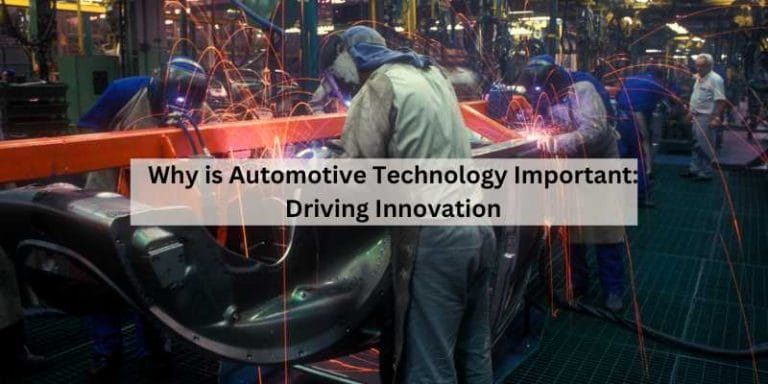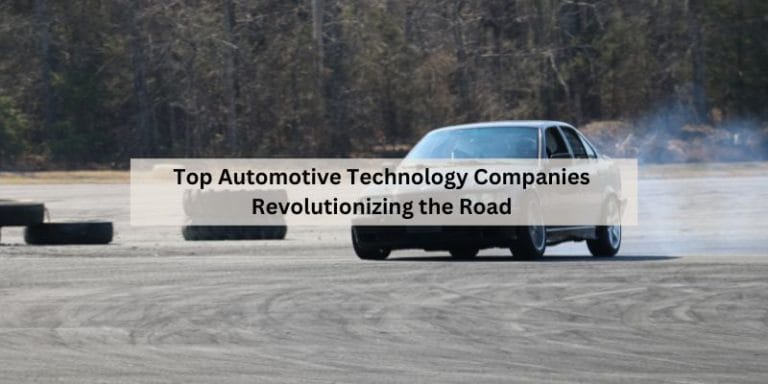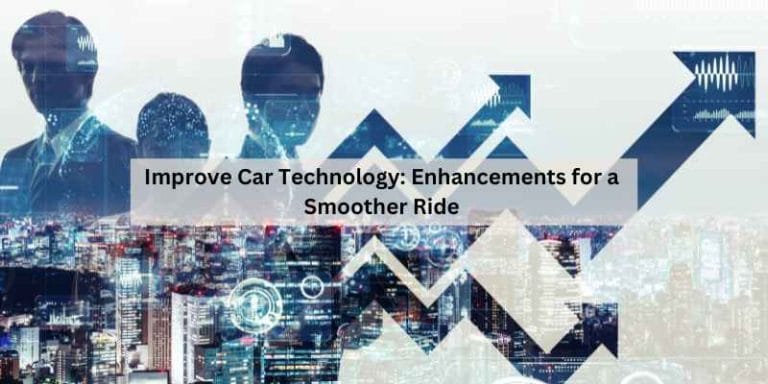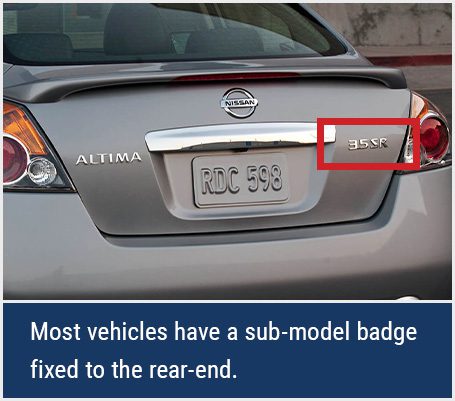Latest Trends in Automotive Technology: 2026 Innovations
The latest trends in automotive technology include autonomous driving, electric vehicles, connected cars, and advanced driver assistance systems. These innovations are shaping the future of transportation by enhancing safety, efficiency, and sustainability.
From self-driving cars to regenerative braking, the automotive industry is at the forefront of technological advancements that are revolutionizing how we drive and interact with vehicles. As we move towards a more connected and eco-friendly future, these trends are not only changing the way we commute but also paving the way for a smarter and greener automotive landscape.
Stay tuned as we delve deeper into these exciting developments that are driving the automotive industry forward.
The Electric Revolution: Evs Leading The Charge
Next-gen Battery Tech: Powering The Future
The automotive industry is witnessing a paradigm shift with the emergence of next-generation battery technologies. These advanced batteries are set to revolutionize electric vehicles (EVs) by offering enhanced energy density, longer lifespan, and faster charging capabilities. With innovations such as solid-state batteries and lithium-sulfur batteries, the future of automotive technology is poised to be driven by more efficient and sustainable power sources.
Charging Infrastructure: Fuelling The Network
As electric vehicles gain traction, the development of robust charging infrastructure is pivotal to support their widespread adoption. The establishment of fast-charging stations and the integration of wireless charging technologies are reshaping the EV landscape. With a focus on convenience and accessibility, the expanding charging network is poised to alleviate range anxiety and accelerate the transition to electric mobility.
Self-driving Vehicles: Navigating The Road Ahead
Discover the future of automotive technology with self-driving vehicles leading the way. From augmented reality to electrification, the latest trends are reshaping the industry towards safer and more connected driving experiences.
The automotive industry is at the forefront of technological advancements, and one trend that is revolutionizing the way we think about transportation is self-driving vehicles. From assisted driving technologies to full autonomy, autonomous vehicles are paving the way for a future where cars can navigate the roads without human intervention.
Autonomous Technologies: From Assisted To Full Autonomy
Autonomous technologies have come a long way in recent years, evolving from simple driver-assistance features to full autonomy. Today, we see vehicles equipped with advanced sensors, cameras, and artificial intelligence systems that enable them to perceive their surroundings, make decisions, and navigate the roads with minimal human intervention.
From adaptive cruise control and lane-keeping assistance to self-parking and automated emergency braking, these technologies are transforming the driving experience. As we move closer to full autonomy, the focus is on developing robust systems that can handle complex driving scenarios and ensure passenger safety.
Safety And Regulation: Balancing Innovation With Public Trust
While autonomous technologies offer immense potential, ensuring safety and building public trust are paramount. Regulators and industry stakeholders are working together to establish guidelines and standards that govern the development and deployment of self-driving vehicles.
From addressing cybersecurity concerns to defining liability in the event of accidents, safety and regulation play a crucial role in shaping the future of autonomous vehicles. Building public trust is essential to overcome skepticism and ensure widespread adoption of this groundbreaking technology.
As the automotive industry continues to innovate, self-driving vehicles are set to revolutionize transportation as we know it. With advancements in autonomous technologies and a focus on safety and regulation, we are navigating the road ahead towards a future where cars can drive themselves, making our roads safer and more efficient.
Connectivity And The Internet Of Cars
The automotive industry is undergoing a significant transformation with the integration of advanced connectivity and the concept of the Internet of Cars. This revolution is paving the way for innovative technologies that enhance vehicle safety, efficiency, and the overall driving experience.
V2x Communication: Beyond Vehicle-to-vehicle
V2X (Vehicle-to-Everything) communication extends beyond vehicle-to-vehicle interactions. It encompasses vehicle-to-infrastructure, vehicle-to-pedestrian, and vehicle-to-network communications. This technology enables cars to exchange vital information with other entities, leading to improved road safety and traffic management.
Data Security: Protecting Privacy In A Connected World
With the increasing connectivity of cars, the need for robust data security measures becomes paramount. Protecting the privacy of drivers and passengers from potential cyber threats is crucial. Advanced encryption, secure authentication protocols, and regular software updates are essential to safeguard sensitive vehicle data.
Shared Mobility: Reshaping How We Travel
Transforming the way we move, shared mobility is revolutionizing travel. Embracing the latest trends in automotive technology, such as autonomous driving and electrification, shared mobility offers a sustainable and efficient transportation solution for the future.
Shared Mobility: Reshaping How We Travel
Shared mobility is transforming the way we travel, making it more sustainable and convenient than ever before. Ride-sharing platforms and subscription services are two of the latest trends in automotive technology that are fueling the growth of collaborative consumption and new models for vehicle access.
H3: Ride-Sharing Platforms: The Growth of Collaborative Consumption
Ride-sharing platforms like Uber and Lyft have revolutionized the transportation industry by providing a cost-effective and eco-friendly alternative to traditional modes of transportation. With ride-sharing, passengers can share a ride with other passengers traveling in the same direction, reducing the number of cars on the road and the carbon footprint of each individual trip. This has led to a significant reduction in traffic congestion and air pollution, making ride-sharing an attractive option for those who care about the environment.
H3: Subscription Services: New Models for Vehicle Access
Subscription services are another popular trend in automotive technology that is reshaping how we travel. These services allow customers to access a variety of vehicles for a fixed monthly fee, without the hassle of owning a car. This is particularly appealing to those who live in urban areas where parking is scarce or expensive. Subscription services also provide a convenient way to try out different types of vehicles without committing to a long-term lease or purchase.
In conclusion, shared mobility is rapidly transforming how we travel, with ride-sharing platforms and subscription services leading the way. As more people embrace these innovative technologies, we can expect to see a significant reduction in traffic congestion, air pollution, and the environmental impact of transportation.
Sustainable Practices In Automotive Manufacturing
Sustainable Practices in Automotive Manufacturing are crucial for reducing environmental impact and promoting eco-friendly solutions.
Eco-friendly Materials: Reducing Environmental Footprint
- Utilizing recycled plastics and bio-based materials
- Reducing energy consumption in manufacturing processes
- Implementing lightweight materials for improved fuel efficiency
Green Factories: The Push For Carbon-neutral Production
- Installing solar panels and wind turbines for renewable energy
- Implementing water recycling systems to minimize waste
- Using energy-efficient LED lighting and smart HVAC systems
Advanced Driver Assistance Systems (adas)
Advanced Driver Assistance Systems (ADAS) are revolutionizing automotive technology, enhancing safety, and making roads smarter. These systems use sensors and cameras to assist drivers in various ways.
Innovations In Safety Features: Preventing Accidents Before They Happen
ADAS includes features like automatic emergency braking, lane departure warning, and adaptive cruise control to prevent accidents by alerting drivers and taking corrective actions.
Integration With Ai: Smarter Systems For Safer Roads
ADAS systems are now integrating with Artificial Intelligence (AI) to analyze data in real-time, making driving decisions smarter and enhancing road safety.
Cutting-edge Infotainment: The In-car Experience
The automotive industry is constantly evolving, and one of the most exciting developments is the cutting-edge infotainment systems that are revolutionizing the in-car experience. From augmented reality dashboards to voice assistance and AI, these advancements are reshaping how we interact with our vehicles.
Augmented Reality Dashboards: A New Look At Navigation
Augmented reality dashboards are redefining traditional navigation systems. By overlaying digital information onto the real world, drivers can receive intuitive, real-time guidance that enhances their driving experience. This technology provides a new level of spatial awareness, making navigation more engaging and user-friendly.
Voice Assistance And Ai: Conversational Interfaces Hit The Road
Voice assistance and AI are taking the in-car experience to new heights with conversational interfaces that allow drivers to interact with their vehicles using natural language. From adjusting climate control to finding the nearest coffee shop, drivers can simply speak commands, making the driving experience safer and more convenient.
Blockchain In Automotive: The New Frontier
Secure Transactions: Revolutionizing Vehicle Sales And Leasing
Blockchain technology is revolutionizing the automotive industry by ensuring secure transactions in vehicle sales and leasing. Through its decentralized and tamper-resistant nature, blockchain technology eliminates the need for intermediaries, streamlining the process and enhancing security.
Supply Chain Transparency: Ensuring Authenticity And Quality
Blockchain technology provides supply chain transparency in the automotive industry, ensuring authenticity and quality of parts and components. By creating an immutable ledger of transactions, blockchain enables stakeholders to trace the origin and history of automotive components, thereby enhancing transparency and trust.
Frequently Asked Questions
What Is The Latest Technology In Automobiles?
The latest technology in automobiles includes driverless technology, augmented reality, electric batteries, heads-up display windshields, connection, and regenerative braking. Additionally, the five automotive megatrends are transforming the industry with significant impacts on memory and storage requirements for use in vehicles.
These megatrends include autonomous driving, electrification, enriched cabins, connectivity, and zonal architectures. The rise of electric vehicles and sustainability is also a recent trend in the automotive industry.
Which Is A Recent Trend In The Automotive Industry?
The recent trend in the automotive industry includes electric and hybrid vehicles, connected cars, autonomous vehicles, advanced driver assistance systems (ADAS), advanced manufacturing techniques, battery technology, cybersecurity, cloud computing, and big data utilization. These technologies are transforming the automotive industry and shaping the future of transportation.
What Are The Technological Trends In Vehicles?
The technological trends in vehicles include autonomous driving, augmented reality, electric batteries, heads-up display windshields, and connectivity. These advancements are transforming the automotive industry and paving the way for the future of cars. Additionally, regenerative braking, connection, and cybersecurity are also key trends in the automotive sector.
These innovations are shaping a safer, more efficient, and connected driving experience.
What Are The Mega Trends In The Automotive Industry?
The mega trends in the automotive industry are autonomous driving, electrification, enriched cabins, connectivity, and zonal architectures. These are transforming the industry with significant impact on memory and storage requirements for vehicles.
Conclusion
The automotive industry is constantly evolving with the latest technology trends. From autonomous driving and augmented reality to electric batteries and connectivity, these advancements are reshaping the future of cars. As manufacturers strive to meet consumer demands for safety, sustainability, and convenience, the industry faces new challenges and opportunities.
By embracing these trends, automakers can stay ahead in a competitive market and provide innovative solutions for transportation needs. Stay tuned for further developments in this exciting field.

